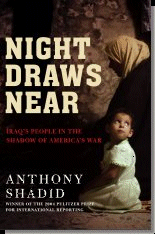I don't have an idea right off for a novel, but my favorite about theocracy, or at least the authority of a religious hierarchy, is Roy Mottahedeh's Mantle of the Prophet. It's a phenomenal read--a gripping narrative laced tightly to its surroundings.First published in 1985, Mantle of the Prophet: Religion and Politics in Iran earned high praise from Fouad Ajami:
Twenty years later--and at time with much intemperate language flowing between Tehran and Washington--it is a little odd to read Ajami's closing lines:Six years after the Iranian revolution, we have an exquisite book on the culture of Iran, the Shiite clerical class responsible for the revolution and the
madresehs, the religious seminaries from which the clerics emerged. ''The Mantle of the Prophet'' is the work of Roy Mottahedeh, a gifted scholar.... He has drawn on a massive amount of learning, but he has got the scholarly apparatus out of the way and made his book accessible to a wide audience. He writes of Iran with tenderness and affection. ''Love for its heritage informs everything I have written here,'' he says. And he is as good as his word. He discusses the ways in which the Iranians have expressed themselves, the manner in which they have escaped the tyranny of their rulers by turning to poetry and making it ''the central icon of their culture, the focus of emotion in which every speaker of Persian has felt he or she could see something essential of himself or herself.'' He illuminates the style of Persian culture that revolutionary Iran has been trying to destroy: the love of ambiguity....
At the center of ''The Mantle of the Prophet'' is a young mullah, Ali Hashemi (a pseudonym), born in the early 1940's. He is both Mr. Mottahedeh's subject and literary device. The large narrative of Iran's history is woven around the story of Ali Hashemi's life. There are two distinct voices in the book: one that recounts Ali Hashemi's life, and Mr. Mottahedeh's own, which he uses in describing Iranian history. It is through Ali Hashemi that we see Iran's mosques and bazaars, ''the two lungs of public life in Iran.'' (Click here to read more of this insightful review.)
We have to wait for Iran to make its peace with itself and the world. But we have to make an effort too. ''The Mantle of the Prophet'' is a work of reconciliation and reflection. Rising above the current feud between Iran and the West, it speaks of gentler sentiments. And like Persian poetry that speaks in allegory, it leaves open the possibility of a world beyond one of rage and bitterness.Anthony Shadid is a reporter for the Washington Post and the author of Night Draws Near:
 Iraq's People in the Shadow of America's War. He has reported from throughout the Middle East for a decade, first as Cairo correspondent for The Associated Press and then for the Boston Globe, where he drew attention for reports from the West Bank and other fronts. His first book, Legacy of the Prophet, drew praise from the late Edward Said. For his work in Baghdad he has received the Overseas Press Club Award (his second), the Michael Kelly Award, and was given the 2004 Pulitzer Prize for International Reporting.
Iraq's People in the Shadow of America's War. He has reported from throughout the Middle East for a decade, first as Cairo correspondent for The Associated Press and then for the Boston Globe, where he drew attention for reports from the West Bank and other fronts. His first book, Legacy of the Prophet, drew praise from the late Edward Said. For his work in Baghdad he has received the Overseas Press Club Award (his second), the Michael Kelly Award, and was given the 2004 Pulitzer Prize for International Reporting.Michiko Kakutani wrote of Night Draws Near:
It leaves the reader with a devastating sense of the gap between the war's aims and its aftermath and the gap between the administration's rhetoric and the realities on the ground. Though much of the factual material in the book will be familiar to dedicated newspaper readers, Mr. Shadid does a fluent job of pulling all this information into a riveting narrative that is animated by his up-close and personal portraits of individual Iraqis.Yesterday, Shadid's long feature "The Towering Dream of Dubai" appeared on the front page of the Post.
I thank him for his suggestion.
--Marshal Zeringue





